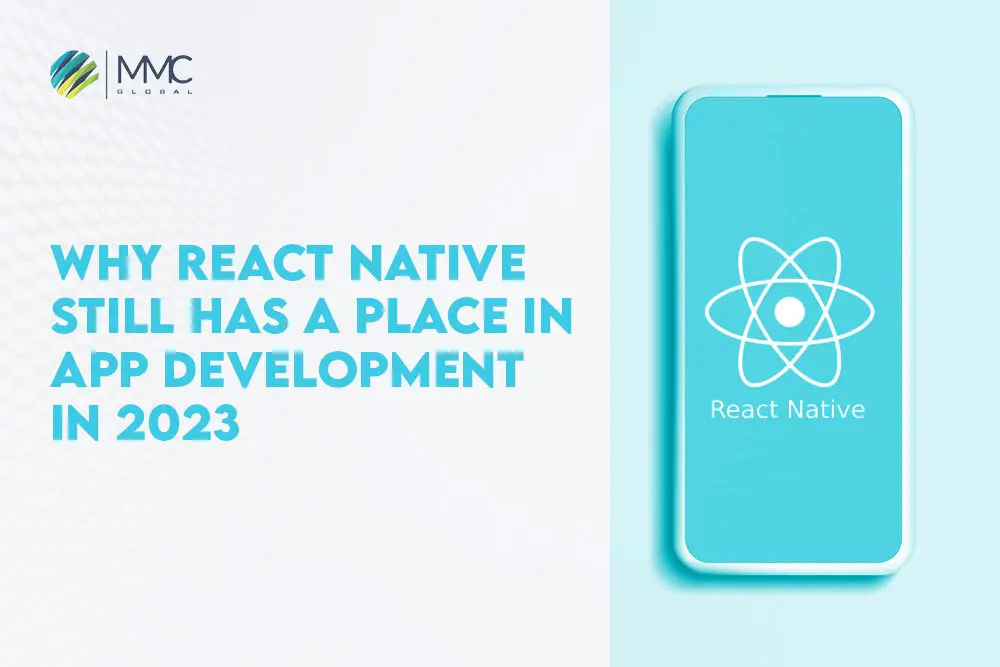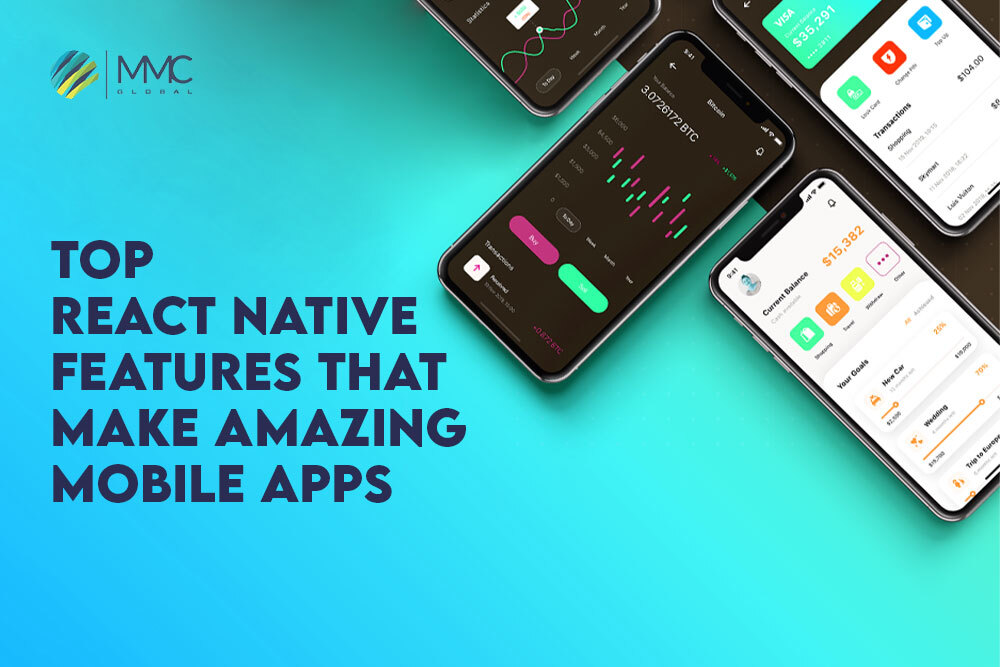Developers are exciting as they have multiple programming languages, libraries, frameworks, and other tools for mobile app development. They can pick appropriate and suitable tools to make a perfect mobile app with the specific requirements of Android and iOS app development.
In some cases, developers are very confused when they have to choose one over other tools as there are multiple frameworks that contain similar functionality and features but make a competitive edge over each other.
Similarly, the war between React Native app development and Swift app development has been going on for so long. React Native vs. Swift debate starts whenever a developer starts developing a mobile app for cross-platform. Before differentiating React Native and Swift app development, let’s first understand where they are used and what cross-platform applications are?
Cross-Platform Application
Developing a mobile app that can run on multiple platforms, mainly iOS and Android, is called a Cross-Platform application. Developers can easily build apps with the same codebase for both platforms. There are many cross-platform app development companies that deliver result-driven services and consult you on why you have to choose Cross-platform applications.
However, you must contract with the terminology “Hybrid app development,” and if you think they are the same, you are wrong enough. Both are different and play different roles, so don’t think they are similar. You can differentiate it based on app performance, customization, UX, and navigation pattern.
Although cross-platform apps will provide simple installation, reliable functioning, and low production costs as well as you can expect robust UX and navigation patterns. Today’s cross-platform app development is common thanks to the React Native, Xamarin, and Flutter frameworks.Cross-platform app with React Native app development
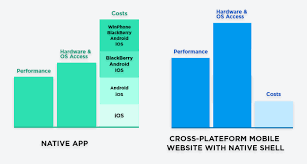
When should I think about creating a cross-platform app?
- With a constrained budget, timeframe, and resource allocation, you must deliver a mobile application across many platforms.
- It caters to audiences of both Android and iOS.
- You require the fastest development in less time.
- The app isn’t complicated and doesn’t require platform-specific functionality.
The Popular Cross Platform App Development Frameworks are React Native, Xamarin, and Flutter. I hope this will help you to know what a cross-platform app is and why we are going to discuss their development with React Native and Swift, especially for iOS app development. Let’s move to the main topic and continue learning more about React Native and Swift in mobile app development.
Read More: Flutter vs. React Native: What to use in 2022
What is React Native Framework?
React Native is an open-source javascript framework that helps to build mobile applications for both platforms. As a result, developers may reuse up to 70% of the code between platforms like Android and iOS. Cross-platform app development takes less time and money because of code sharing. On GitHub, React Native has 17.5K forks and 78.3K stars.
Moreover, you can hire React Native developers from the leading React Native development companies such as MMC GBL. We have done a wide range of projects based on React Native, and we are very confident in showcasing our portfolio.
It is a powerful and most used framework, and developers love its features and functionalities, saving developers a lot of time. Consider adopting React Native if you’re designing a well-known, large-scale product. It offers thorough documentation and excellent technical assistance.
Pros & Cons of React Native App Development
Determining the pros and cons before choosing React Native app development can help you to analyze what suits your development process.
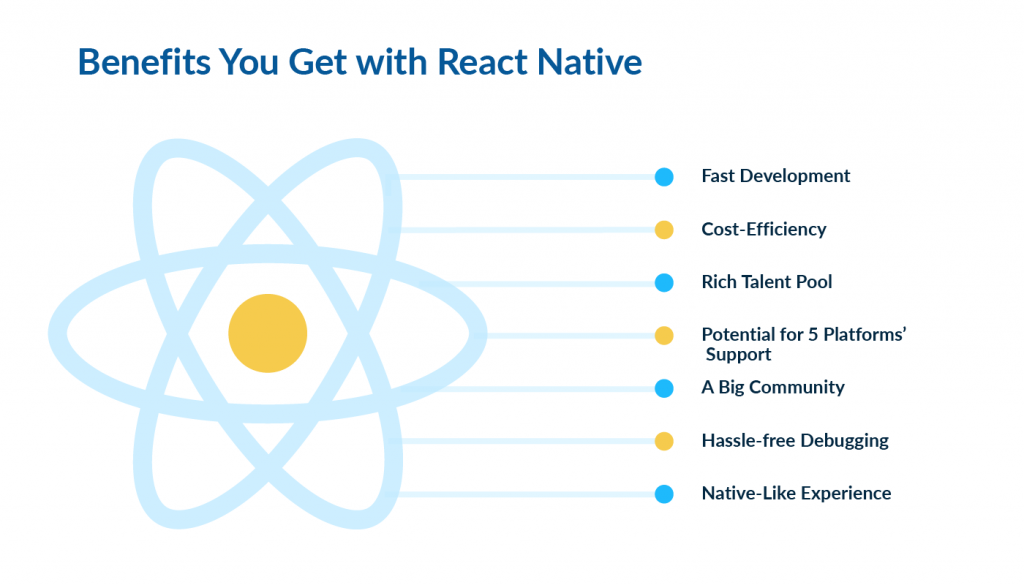
Pros:-
Flawless performance and Extensive Speed
Due to the fact that they were created specifically for an operating system, native applications make the most of the device’s processing power. The apps operate smoothly and with respectable performance.
Reduce Cost and Time
As React Native app development helps to build cross-platform apps, the main responsibility is to reduce time and cost. And yes, React Native made it possible. Having capabilities of sharing and reusing code for both platforms, developers save time and build apps in less time.
Offline Environment
Without Internet access, native apps can still run. An Internet connection is required if you need suitable capabilities to create a native application.
UI / UX Design capabilities
With React Native app development, the front end of mobile applications can empower with exciting UI UX design. Easy-to-use animations, embedded videos, and other futuristic approaches can enhance the app’s appearance. React Native offers an extensive range of UI UX component libraries that helps to build the fastest animation-based app pages.
Read More: 9 Best React Native UI Components to Use in 2022
Easy to Navigate
Mobile app navigation is essential because the user experience totally depends on how your app navigates from one point to another. React Native helps a lot in this case. It provides easy roadmaps that are effective for app users to navigate apps.
Latest Developer Tools and SDK
Developers have exposure to frequently updated libraries and solutions that connect with a particular OS. The JavaScript library used by React Native app development enables the creation of apps for both iOS and Android operating systems.
Hassle-Free Application Testing
There are testing and refinement phases when using a cross-platform framework such as React Native. Still, in the end, you will have an easily adaptable application to the preferred platform.
Cons:-
Costly for Startup Business
There is a minor flaw that will cause major problems for projects with a little budget. For instance, native apps will be extremely expensive for a startup. Obviously less expensive than reactive jets but still comparable to shouldering the expenditure.
Frequent Updates
React Native often changes its features. Prepare to deliver app updates more often as a result.
Security Issues
React Native has a security validity gap because it is an open-source framework. You must include additional security fixes if you plan to create fintech apps.
Read More: 8 Amazing Ways iOS Application Development Builds Your Company
What is Swift App Development?
Swift is a programming language specifically for iOS, iPadOS, macOS, tvOS, and watchOS. Swift app development offers contemporary programming features, and writing Swift code is enjoyable, which developers admire. The syntax is short and descriptive. Swift code is secure by default and results in blazing-fast software.
Swift is a multi-paradigm, all-purpose programming language, Apple and the open-source developer community created it at first. When this language was introduced in 2014, Objective-C, Apple’s previous programming language, was mostly intended to be replaced.
Since Objective-legacy C’s has been eliminated by the language, writing code is now incredibly simple and has almost no disadvantages. The simplest method for developing an iOS app is this.
The process of developing a Swift app so that it may operate on many platforms is known as cross-platform development. Swift is ideal for applications that require complex infrastructure, native iOS functionality, and in-app purchasing.
Pros & Cons of Swift App Development
With the additional ease and involvement of well-known scripting languages, Swift app development combines the effectiveness and performance of compiled languages. Let’s look at some of the advantages and disadvantages of this Programming Language.
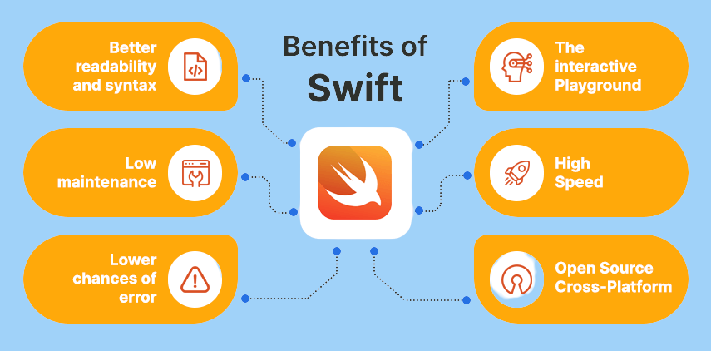
Pros:-
Rapid development process
Swift is simpler to understand and write because it is a clear, expressive language with a streamlined syntax and grammar. Compared to Objective-C, it is far more succinct, which results in less code being needed to do the same task.
Simplify Apps’ Scalability
You receive a product that is long-term and can be expanded with additional features as demanded in addition to a shorter development time. Swift app development projects may usually be scaled more easily. For long-term investment, the fact that Swift app development is more likely to be supported by Apple than Objective-C should also be given considerable thought.
High Performance
The language was first created to emphasize performance and speed to exceed its forerunner. In particular, the original version boasted a 40% improvement in performance over Objective-C. Swift is literally swift when it comes to measuring the app’s performance.
Safety and Security
Swift’s safety is one of its greatest strengths. Error handling features and strong typing avoid code crashes. The amount of time and effort required for bug repair is decreased since developers can quickly identify and correct flaws in the code.
Integration with Objective-C
Objective-C and Swift may be used in the same project since they are compatible with one another. It is especially advantageous for large renovation or expansion projects. By utilizing the Objective-C codebase, developers may use Swift to add new features. Additionally, it facilitates a secure and simple transmission process.
Cons:-
Only Entertain iOS Platform
You can only execute Swift on native devices because it is a native platform. You must create a separate app if you want to develop applications for both iOS and Android.
Small Community Support
Although the Swift community is expanding quickly, it is still significantly smaller than those of other open source programming languages. According to the poll, only 8.1 percent of the 78,000 developers surveyed by StackOverflow utilize Swift. Another freelance company, Upwork.com, claims that a skills gap may arise due to the rapid growth in demand for Swift developers.
Read More: How to Start iOS App Development On Windows? A Comprehensive Guide For You
Comparison of React Native App Development vs. Swift App Development
Let’s compare in-depth to analyze the best framework or programming language for iOS app development.
Faster Development
If you are asking for only iOS app development, then swift can help you the best as it is mainly introduced for the iOS platform. On the other hand, React Native is also the second best option if you are seeing your app for the long term. Maybe you will have to build for Android, so ReactNative code is easy to reuse for Android app development. Both can give you the fastest development but React Native app development gives the opportunity to build further with the same codebase.
Programming Languages
React Native is a framework that uses Javascript as a programming language. The fan following of JavaScript is huge, and that’s why there is huge community support for beginners or intermediate-level developers.
If we talk about Swift, it is itself a programming language that is built in the replacement of objective-C. Apple Company developed this language to build their products.
User Interface
Application components resemble native ones in appearance. React Native employs native components, so developers can be certain that their applications’ features will update immediately in response to any OS UI upgrade.
Swift does a terrific job integrating into iOS design and utilizing UX concepts as the primary iOS language created by Apple for designing apps. But creating an app using Swift is like starting from scratch when creating a native app. As a result, each component needs to be designed specifically for it and polished to perfection.
App Performance
Another thing to think about is the performance of Swift versus React Native. A Swift app will often perform better than a framework. Swift has a higher performance than React Native, despite the fact that executing an application on it might use more CPU resources.
Using the React Native framework while working with graphic effects might be challenging. ReactNative offers developers the option of using custom code within the application, as well as a variety of resources and tools to address various issues.
Development Company
You can find both if you are looking for Swift or React Native app developers. But compared to the Swift developers, you can interact with React Native developers more. People are less interested in learning Swift because the demand for React Native developers is high.
But there are companies who can help you with both React Native and swift, like MMCGBL. MMC GBL provokes high-functional mobile and web apps as per requirements. As they have 150+ tech gems with extensive experience, we cater to every advanced technology for our clients. If you need further information, don’t hesitate to reach us.
Read More: How to Start Successful iOS Application Development – A Guide For You
Request a Consultation
Learning Curve
Due to JavaScript, which has been around for many years, React Native is quite simple to understand. Therefore, the language is well-known among developers.
Swift is a simple language to learn. Apple built it knowing that users would have to learn it from scratch. Although few experts who are still interested in it exist, the demand is slightly decreased.
So, Who Wins?
Besides the comparison, we see that both React Native app development and Swift app development are very efficient, fast, scalable, and futuristic frameworks and programming languages for mobile app development. When it comes to iOS app development, Swift is a dedicated language for it with extensive capabilities.
On the other hand, React Native is fully functional for both platforms, which gives the leverage of saving cost and time. It helps you to build an app for the long term and can be adaptable to multiple features hereafter. Both have the potential to make robust and intuitive mobile apps. If you choose and hire an experienced mobile app development team, then building apps is not a big deal. Consult us to know which one is better for your app; we would love to connect with you.

